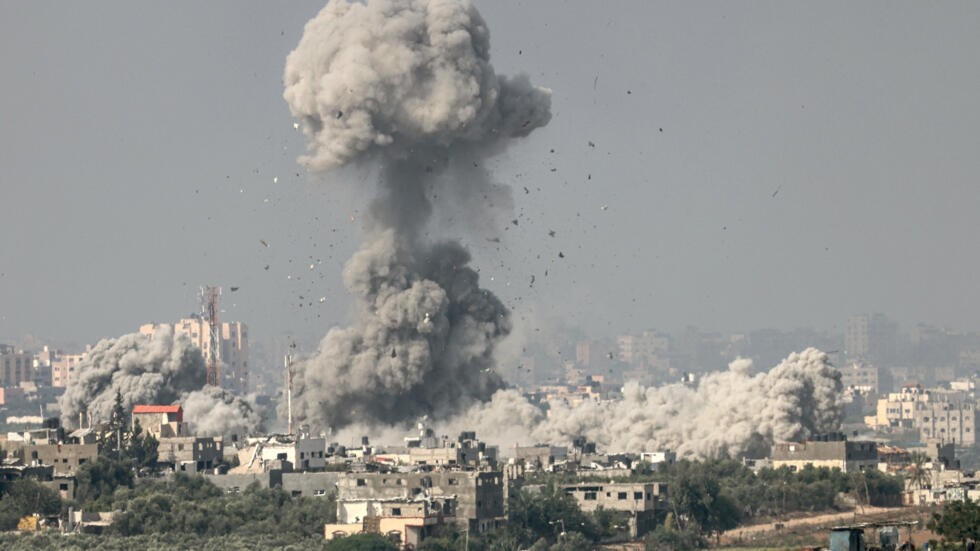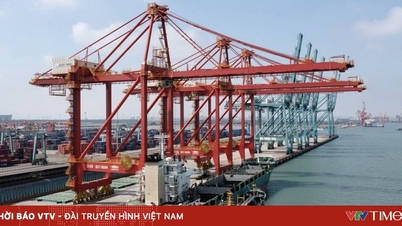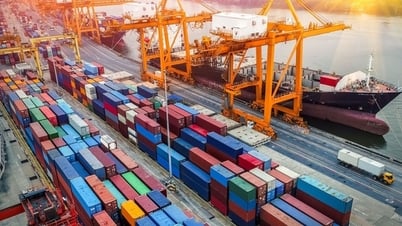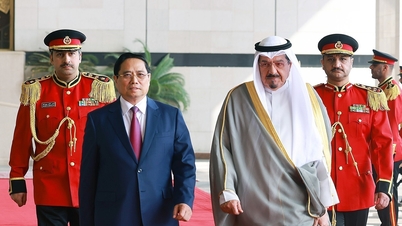 |
| Israel has been shelling targets in the Gaza Strip for more than two weeks since Hamas' cross-border attack on October 7 and is ready for a major offensive. (Source: AFP) |
The above frank assessment of international lawyer Christopher Swift, also a former US Treasury official, is that the more unstable the economy is, the more likely bad actors in the region will be "surprise attacks", easily stirring up the situation, making it worse than ever.
"The war between Israel and Hamas could deal a heavy blow to the global economy ," was the general opinion of officials attending the Future Investment Initiative (FII) Forum, often called "Davos in the desert", which took place earlier this week in Saudi Arabia.
“What has happened in Israel and Gaza – when you take all these bad things together, I think… it will have a terrible impact on the world economic development… even more serious,” said World Bank (WB) President Ajay Banga.
The Israel-Hamas conflict has put economic growth at a “dangerous moment.” “I think we are at a very dangerous moment,” the World Bank chief warned. The fierce fighting risks drawing in other countries, particularly Lebanon, home to the Iran-backed militant group Hezbollah, which regularly battles Israeli forces.
Egypt, Jordan, Lebanon… and more
The economic crises are spreading across the countries bordering Israel, raising the possibility of a chain reaction from the Israel-Hamas conflict, making the already poor financial and political stability of Egypt, Jordan and Lebanon… even worse, and creating more problems.
In particular, each of the three countries faces different economic pressures, prompting the International Monetary Fund (IMF) to warn in a September report that they could lose “social and political stability” at any time.
That warning came just before Hamas attacked Israel on October 7, sparking a dangerous war — more contagious than thought, causing economic chaos, which US President Joe Biden and the European Union (EU) will likely need to address soon.
The potential consequences are now beginning to be dissected, analyzed, and recognized by world leaders and policy analysts. The Biden administration is committed to preventing the Israel-Hamas conflict from widening, which could exacerbate economic tensions and potentially lead to the collapse of governments.
If the chaos is left unchecked, it could spread across a region vital to global oil supplies – sending ripples through the world economy.
The situation is so dire that last week, during a meeting with International Monetary Fund (IMF) officials, European Council President Charles Michel asked them to do more to support the Egyptian government, which he said was under pressure from a wave of migrants from Hamas-controlled Gaza, as well as people fleeing civil war in Sudan.
Egyptian President Abdel Fattah el-Sissi currently refuses to accept Palestinian refugees because he fears Israel wants to permanently expel Palestinians and nullify Palestinian demands for statehood. The Egyptian leader has also said that a mass exodus would risk bringing militants into the Sinai Peninsula.
More than a million people have now been displaced from Gaza and the threat of an escalation of the war has loomed with clashes along the Lebanon-Israel border between the Israeli army and Hezbollah militants.
“To assume that there will be no migration of people is naive and superficial,” commented lawyer Christopher Swift. According to him, any “surprise blow” from outside to Egypt, whether it is an economic blow, or simply a sudden mass migration from Gaza to Sinai… could have a destabilizing effect.
Analysis by a former US Treasury official suggests that, although the Egyptian government is heavily dependent on US economic and military support, it is increasingly popular opinion in Egypt that will determine the actions of the country's leader - a lesson learned from the Arab Spring protests that toppled the Mubarak regime in 2011.
In April, the IMF concluded that Egypt's financing needs in 2023 were equivalent to 35% of GDP. On October 5, Moody's further downgraded Egypt's debt, which was already junk-grade—the lowest rating on Moody's's scale. The downgrade comes as previous efforts have failed to help the Egyptian economy, which was saddled with about $160 billion in debt at the end of last year.
“Egypt is in the worst economic crisis I can remember in at least five decades,” said Mirette F. Mabrouk, director of the Egypt Studies Program at the Middle East Institute, “and conflict will only compound the current turmoil.”
If there is a “fire” in Gaza, then the rest of the region needs to be stable, so that people can make the right and appropriate choices, Mabrouk said, adding that there is no need for more instability in an already unstable region.
One of the most immediate signs of growing distress is that Egypt's central bank this past week imposed foreign currency restrictions on cards linked to local bank accounts, Mabrouk said.
One potential major setback for Egypt from the latest Israel-Hamas conflict is the loss of tourists eager to explore the country’s history and ancient pyramids. Tourism is one of Egypt’s leading economic sectors, and foreign investment provides much-needed access to the rest of the global economy.
Danger is at the "doorstep"
The outlook is no brighter than Egypt’s, according to the IMF, and amid the risk of spillover from the Israel-Hamas conflict, neighboring Jordan is struggling with slower economic growth and less foreign investment. Its debt outlook is better than Egypt’s, but unemployment is “entrenched” in double digits, according to financial data provider FactSet.
According to the World Bank, the size of Lebanon's economy has more than halved from 2019 to 2021. The country's currency, pegged to the US dollar since 1997 at 1,500 Lebanese pounds to 1 USD, is now trading at around 90,000 Lebanese pounds to 1 USD.
While many businesses have started calculating in dollars, workers still receive salaries in local currencies that have seen their purchasing power plummet. Many now rely on remittances from relatives abroad to survive. International donors including the US and Qatar are subsidizing the salaries of soldiers in the Lebanese army.
The Lebanese government reached a tentative deal with the IMF on a bailout in April 2022, but has so far failed to implement most of the reforms needed to complete the deal.
In a report earlier this year, the IMF warned that without reforms, public debt in the small, crisis-stricken country could reach nearly 550% of GDP. Most recently, before the Israel-Hamas war, some officials had raised hopes of a resurgent tourism industry as a lifeline for the economy.
But as the Israel-Hamas conflict threatens to spill over into Lebanon – with small-scale clashes regularly taking place between Hamas-allied Hezbollah militants and Israeli forces on the country's southern border – foreign embassies have warned their citizens to leave and airlines have cancelled flights to the country.
“If tensions spill over into the Gulf, the conflict would have the potential to have a serious impact on international markets and already struggling economies and populations around the globe,” said Paul Salem, president of the Middle East Institute in Washington.
The danger is not only at the "doorsteps" of Egypt, Jordan or Lebanon..., said Paul Salem, President of the Middle East Institute in Washington, "if tensions spread to the Gulf region, this conflict will have the potential to have a serious impact on international markets, as well as on struggling economies and populations around the world."
“If these problems are not addressed, it could mean more global terrorism, which means more instability… more societies with more fear and less hope,” said Larry Fink, CEO of BlackRock Investment Fund.
Source







![[Photo] General Secretary To Lam and National Assembly Chairman Tran Thanh Man attend the 80th Anniversary of the Traditional Day of the Vietnamese Inspection Sector](https://vphoto.vietnam.vn/thumb/1200x675/vietnam/resource/IMAGE/2025/11/17/1763356362984_a2-bnd-7940-3561-jpg.webp)







































































































Comment (0)